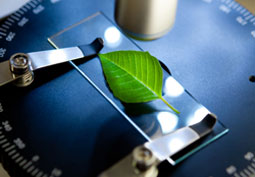Biotechnology – Investing in the Future
 There are many pre-conceptions about biotechnology and its uses, and everything you think you know could be wrong. The OECD defines biotechnology as "the application of scientific and engineering principles to the processing of materials by biological agents". Essentially, it is the use of living organisms to make useful products. Biotechnology has been used for thousands of years for many intriguing and practical purposes such as making bread and cheese, preserving dairy products and fermenting beer.
There are many pre-conceptions about biotechnology and its uses, and everything you think you know could be wrong. The OECD defines biotechnology as "the application of scientific and engineering principles to the processing of materials by biological agents". Essentially, it is the use of living organisms to make useful products. Biotechnology has been used for thousands of years for many intriguing and practical purposes such as making bread and cheese, preserving dairy products and fermenting beer.
Production can be carried out by using intact organisms, such as yeasts and bacteria, or by using natural substances from organisms. From new drugs that combat disease to industrial processes that use renewable feedstock rather than crude oil to crops that can grow in rough climatic conditions and ensure safe and affordable food, biotechnology is paying economic, social and environmental dividends.
There are three major fields of biotechnology: agricultural, healthcare and industrial. Agricultural biotechnology encompasses a range of modern plant breeding techniques. For centuries, farmers have sought to improve their crops by relying on the random rearrangement of existing genes between two closely related parent plants. Modern agricultural biotechnology improves crops in a more focused manner. The best known technique is genetic modification, which gives plant varieties desirable characteristics such as resistance to certain pests or vitamin fortification.
Industrial biotechnology uses enzymes and micro-organisms to make bio-based products in sectors such as chemicals, food and feed, detergents, paper and pulp, textiles and bio-energy.
According to the United Nations, food production must rise by 50% by the year 2030 to meet the demands of a growing population. Agricultural biotechnology has been shown to multiply crop production, and it offers built-in protection against insect damage, resulting in a decrease in pesticide spraying. It helps reduce fuel use and carbon dioxide emissions by requiring less tillage and helps farmers grow more food in harsher climatic conditions. It produces food containing fewer toxins and protects soil from erosion and compaction by enabling farmers to reduce the need to plough their fields.
 Healthcare biotechnology refers to a medicinal product that contains living organisms and may be manufactured by combining DNA sequences that would not normally occur together. It accounts for more than 20% of all marketed medicines and it is estimated that by 2015, 50% of all medicines will come from biotech. Biotech medicine is used to treat and prevent every day and chronic illnesses including heart attacks, stroke, multiple sclerosis, breast cancer, cystic fibrosis, leukaemia, diabetes, hepatitis and other rare or infectious diseases. Healthcare biotech increases the effectiveness and safety of treatments as well as reducing the use of ineffective treatments and adverse reactions.
Healthcare biotechnology refers to a medicinal product that contains living organisms and may be manufactured by combining DNA sequences that would not normally occur together. It accounts for more than 20% of all marketed medicines and it is estimated that by 2015, 50% of all medicines will come from biotech. Biotech medicine is used to treat and prevent every day and chronic illnesses including heart attacks, stroke, multiple sclerosis, breast cancer, cystic fibrosis, leukaemia, diabetes, hepatitis and other rare or infectious diseases. Healthcare biotech increases the effectiveness and safety of treatments as well as reducing the use of ineffective treatments and adverse reactions.
The healthcare biotechnology industry comprises more than 1,700 companies and a market worth more than €17 billion in Europe alone. Between 2000 and 2008, employment in all departments of companies working on the development of drugs for rare disease patients in the EU more than doubled, showing an increase of 158% according to the UK’s Office of Health Economics.
Industrial biotechnology uses enzymes and micro-organisms to make bio-based products in sectors such as chemicals, food and feed, detergents, paper and pulp, textiles and bio-energy. In doing so, it uses renewable raw materials and offers one of the most innovative approaches towards lowering greenhouse gas emissions. The application of industrial biotechnology has been proven to make significant contributions towards mitigating the impacts of climate change. In addition to environmental benefits, biotechnology can improve industry’s performance and product value, and as the technology develops and matures, it will yield more and more viable solutions for the environment. The industry is worth almost €2 trillion and provides about 22 million jobs in Europe across sectors as diverse as agriculture, forestry, fisheries, food, chemicals and bio-fuels.
 Biotechnology stocks continue to be some of the strongest performers in the markets as favourable legislation introduced in the US in 2012, has helped boost investor optimism within the industry. Total venture capital financing was about 30% up in the first quarter of 2012 compared with the same period a year earlier, and a few acquisitions have occurred this year, including Amgen’s takeover of Micromet, Biogen Idec’s buyout of Stromedix, and Celgene’s acquisition of Avila Therapeutics. Biotech mergers & acquisitions activity is currently at a four-year high as large pharmaceutical companies are facing potential sharp drops in revenue as patents expire.
Biotechnology stocks continue to be some of the strongest performers in the markets as favourable legislation introduced in the US in 2012, has helped boost investor optimism within the industry. Total venture capital financing was about 30% up in the first quarter of 2012 compared with the same period a year earlier, and a few acquisitions have occurred this year, including Amgen’s takeover of Micromet, Biogen Idec’s buyout of Stromedix, and Celgene’s acquisition of Avila Therapeutics. Biotech mergers & acquisitions activity is currently at a four-year high as large pharmaceutical companies are facing potential sharp drops in revenue as patents expire.
Investing in biotechnology stocks is risky. The majority of biotechnology firms have less than 50 employees, and they are difficult to research due to their relatively small size. As they often do not have any cash flow and investors have little indication of the status of their research, big announcements often come by surprise. Investing in these stocks can be a long-term play, but it can pay off handsomely. On the other hand, the sector is comprised of companies that have a high failure rate on everything they attempt to invent. Investing in a biotechnology exchange-traded fund may be the safest way to commit funds to the sector, but for those keen on due diligence, the sector can prove very profitable.
Biotechnology stocks continue to be some of the strongest performers in the markets as favourable legislation introduced in the US in 2012, has helped boost investor optimism within the industry.
The problem of raising enough funding for research and development, as well as product innovation, is often cited by biotechnology companies and industry associations. Adequate access to finance is difficult for SMEs with no proven track record. Industry groups suggest that to take advantage of the unique opportunities presented by biotechnology, it is essential that the EU develops workable policy measures that support research and innovation in the bio-economy and that problems surrounding access to finance are solved.
EuropaBio, the European association for bio-industries, recently announced the five candidates that will compete for its Most Innovative EU Biotech SME Award 2012. Global Bioenergies (France) is developing more efficient ways to convert renewable resources such as agricultural waste, sugar and starch into chemical key building blocks and drop-in fuels. Green Biologics Ltd (UK) is an industrial biotechnology company that produces environmentally sustainable bio-chemicals and bio-fuels with a significant reduction in greenhouse gas emissions.
Promethera BioSciences (Belgium) is developing cell therapy products that treat severe genetic liver diseases mainly affecting children as well as acquired liver diseases. ProtAffin AG (Austria) is developing more effective therapies for key global diseases with major unmet need such as Chronic Obstructive Pulmonary Disorder. Finally, to-BBB (Netherlands) has discovered a new technology to enhance drug delivery across the blood-brain barrier to treat medical conditions such as brain cancer, Alzheimer’s disease and multiple sclerosis.


